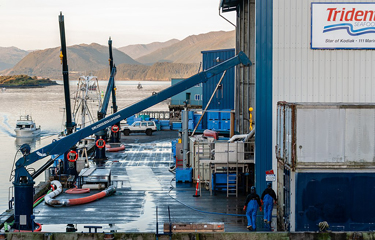Alaska’s seafood industry is reeling after Trident Seafoods announced its plan to sell off several processing plants.
The Seattle, Washington, U.S.A.-based vertically integrated seafood harvesting and processing company, which has a huge footprint across Alaska’s seafood sector, announced on 12 December that it plans to divest itself of its Alaskan assets in Kodiak, Ketchikan, Petersburg, and False Pass, as well as the South Naknek Diamond NN cannery facility and its support facilities in Chignik.
Trident has confirmed it intends to process pollock from the A season, which opens in mid-January, and the tanner crab season in the Kodiak management area, according to Kodiak Mayor Pat Branson.
“But after that, who knows,” Branson told the Cordova Times. “Normally, this is a slower time of the year for Trident’s cannery, and many residents who work there are on vacation. We will be listening and watching to see what happens.”
Besides the jobs the city stands to lose, local taxes paid by Trident represent a major portion of Kodiak’s annual budget, and Branson said she’s unsure what the fiscal impact will be if Trident’s local plant is sold or shuttered. She said she hoped Trident would be transparent and communicative as it moved ahead with its sale process.
“It’s going to affect everyone – whether you’re involved in the fishing business or not – because that’s what our economic engine is here,” she told Alaska Public Media. “Having a major player in our community, like Trident, putting their business up for sale is really a concern for all of us.”
Gerry Cobban Knagin, a commercial fisher based in Kodiak, has sold salmon to Trident in the past but is unsure what she’ll do the same in the 2024 season.
“It raises a tremendous amount of uncertainty in our minds right now of whether or not we will have a market,” Knagin said. “The other processing plants have full fleet, so where does that leave the 45 boats that fish for Trident out of Kodiak? Where do we go? What do we do?”
In Petersburg, local fisher Bob Martin said he was surprised by Trident’s move to sell its local plant instead of its Wrangell facility, which has been used less frequently by the company in recent years.
“They’d skipped a few years, and they fired that up; I thought maybe they were running that just to sell it. I heard that rumor last year, but that was a completely reverse situation because that’s the one they seem to be hanging on to,” he said. “As hard as it was to hear, I guess I’m glad they told us now, instead of later, so it does give us time to curtail any extravagant spending and prepare for the worst.”
Gunnar Knapp, a professor emeritus of economics at the University of Alaska Anchorage Institute of Social and Economic Research, has studied Alaska’s seafood industry for much of his career. He said it’s still too early to determine the exact impact Trident’s move will have on the state, but it will definitely be negative.
“How soon might a buyer be found, what would that buyer’s plans be, and how soon would it take to bring them into effect? What is Trident going to do between now and when a buyer is found?” Knapp said. “Even the very best scenario, which is the buyer is found and smoothly picks up the operation ... [will still] be disruptive to plant employees, fishermen, and the community.”
Knapp said Trident is likely facing a tough financial situation after a very difficult year for Alaska’s processing companies but said Alaska’s seafood industry has always borne the brunt of the high volatility found in the global seafood trade.
“The challenges that they’re facing with regard to their markets ... it’s been a really tough time for them,” he said. “You’ve had many large processors that have been dominant for decades, and then the markets change, and you have plants being bought ... and new players emerge.”
Trident Vice President of Global Communications Alexis Telfer declined a request from SeafoodSource for additional comment.
Alaska Seafood Marketing Institute Food Aid Program and Development Director Bruce Schactler told KRBD that Trident’s announcement heralded a crisis “years in the making.” He called Trident’s announcement “a wake-up call” for the public. Mayor Branson agreed.
“It’s a perfect storm, with a glut in the [seafood] market and this on top of it. It’s not good,” she said. “We’ve been through booms and busts, but this is the worst.”
Larsen Mettler, currently the managing director of S2G Ventures’ oceans and seafood investments and previously chief financial officer of Alaska processor Silver Bay Seafoods and director of KeyBanc Capital Markets’ seafood investment banking portfolio, told SeafoodSource processors got themselves into trouble for three reasons in ...
Photo courtesy of Wikimedia Commons








